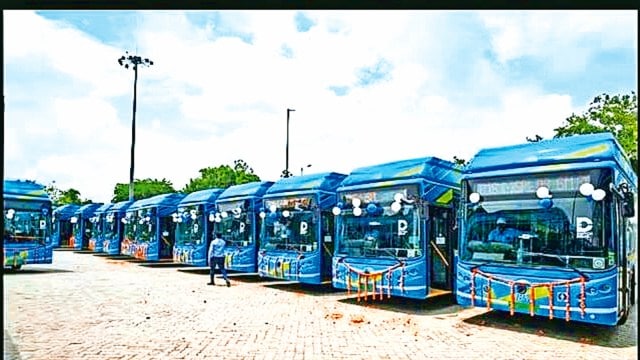Concerns have been raised by activists regarding the accessibility of the first set of 3,600 electric buses being introduced under the PM eBus Sewa scheme, out of the total 10,000 buses. The activists have written to the government asking them to reconsider the decision to procure standard floor buses instead of low-floor buses, as reported by The Indian Express.
The scheme, approved by the Union Cabinet in August, aims to deploy 10,000 electric buses in various cities. The Union Housing and Urban Affairs Ministry, through the agency Convergence Energy Services Ltd (CESL), initiated the first tender for 3,600 electric buses on November 17. The tender, open until December 14, aims to procure buses for cities in Bihar, Gujarat, Haryana, Kashmir, Maharashtra, Meghalaya, Odisha, Puducherry, and Punjab.
The Freedom of Movement Coalition (FMC), a group of activists and NGOs advocating for accessibility, expressed their concerns to Housing and Urban Affairs Secretary Manoj Joshi on October 26, during the draft stage of the tender. They emphasized the importance of following accessibility standards. Despite this, the final tender maintained the same specifications, prompting the FMC to write to the Ministry of Road Transport and Highways (MoRTH) on November 24, claiming that the tender violated the Central Motor Vehicles (CMV) Rules.
According to the letter sent by the activists, the PM eBus Sewa tender for 3,600 Type-I buses specifies a floor height of 900 mm, which includes a footboard and 2 steps, despite their previous representation. They argued that this violated MoRTH’s Automative Industry Standard (AIS) 153, which sets a maximum floor height of 650 mm for Type-I buses, and mandates accessibility for people with reduced mobility, including wheelchair users.
In addition, the activists pointed out that the Central Motor Vehicle Rules, 2022, require a minimum of one space for wheelchair users, contrary to the tender’s requirement of “25%” of buses being accessible. They emphasized that the Rights of Persons with Disabilities (RPD) Act, 2016, mandates access to all modes of transport for PwD, without specifying a percentage.
The activists also highlighted the discrepancy between the tender’s 900 mm floor height requirement and the AIS 153’s maximum height of 650 mm, stating that true low-floor buses, which are ideal for PwD, have a maximum height of 400 mm. They argued that installing hydraulic lifts for accessibility in high-floor buses is not practical for city buses.
The Ministry of Housing and Urban Affairs did not respond to requests for comment, and an MoRTH official stated that the FMC’s representation was pending review.

























+ There are no comments
Add yours